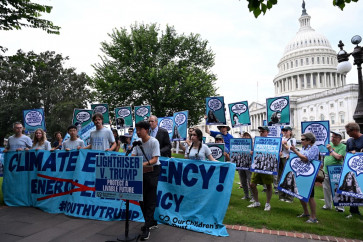Popular Reads
Top Results
Can't find what you're looking for?
View all search resultsPopular Reads
Top Results
Can't find what you're looking for?
View all search resultsHow to fight climate change without the US
Governments and civil society now face a fundamental challenge: Developing viable strategies for achieving climate and biodiversity goals without US involvement.
Change text size
Gift Premium Articles
to Anyone
S
cientists have repeatedly warned us, and with ever-growing intensity, that the planet is hurtling toward climate tipping points. Despite numerous international pledges, the evidence suggests that limiting global warming to 1.5 degrees is increasingly unlikely. If current trends persist, that threshold could be breached as early as 2028.
At the same time, biodiversity loss is accelerating at an unprecedented rate, with dire consequences for vulnerable communities and humanity at large. A stable climate and healthy ecosystems are inextricably linked, implying the risk of cascading catastrophes.
To be sure, there has been some progress on both fronts. The 2015 Paris agreement was the most ambitious and politically viable climate deal of its time. Based on a “pledge and review” model, it set an ambitious yet attainable target and introduced mechanisms to ensure broad participation, while establishing a framework for assessing national commitments against the shared goal.
Then, in 2022, the United Nations Biodiversity Conference (COP15) adopted the Kunming-Montreal Global Biodiversity Framework, following a similar approach. While some major countries like India remained far behind, there was hope that they would eventually join as global momentum continued to build.
That optimism was short-lived. On the very first day of his second term, United States President Donald Trump signed an executive order titled “Unleashing American Energy” and announced that the US would once again withdraw from the Paris agreement, dismissing climate change as a “hoax”.
Governments and civil society now face a fundamental challenge: Developing viable strategies for achieving climate and biodiversity goals without US involvement.
In a recent Bruegel-Center for Economic Policy Research report, we explore how this can be done. We begin with the recognition that while the US remains a major greenhouse-gas emitter, its policies alone are unlikely to determine the planet’s fate. The decisive battleground is now in emerging markets and developing economies (EMDEs), which account for two-thirds of current emissions and are home to most of the world’s biodiversity.



















